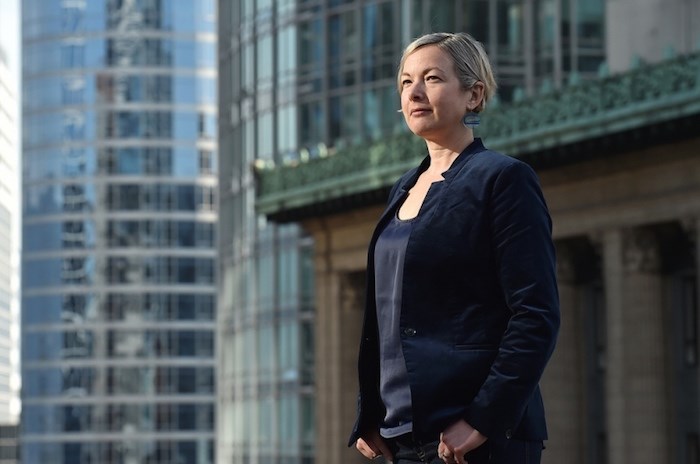Brightside Community Homes Foundation, a Vancouver non-profit affordable housing society that owns and operates 26 buildings, hopes to redevelop five of its properties to more than double the number of units those buildings currently provide.
 Carolina Ibarra, director of strategic initiatives for Brightside, said the development proposals aim to provide more affordable housing in Vancouver, especially for seniors. Photo by Dan Toulgoet/Vancouver Courier
Carolina Ibarra, director of strategic initiatives for Brightside, said the development proposals aim to provide more affordable housing in Vancouver, especially for seniors. Photo by Dan Toulgoet/Vancouver Courier
The sites include:
- the 21-unit Loyal Orange Manor at 1425 East 12th Ave.
- the 36-unit Edward Byers House at 1451 East 12th Ave.
- the 64-unit Alice Saunders building at 2924 Venables St.
- the 46-unit Macleod Manor at 8725 French St.
- the 36-unit Mount Pleasant at 325 East Sixth Ave.
Average rents across the buildings proposed for redevelopment currently go from $732 to $1,250 per month. Across the portfolio, rents range from a low of $180 to a high of $2,828.
Plans are to combine the sites for Edward Byers and Loyal Orange Manor — they sit next to each other on a large property — which means the five sites would be redeveloped into four new buildings.
The five buildings now provide a total of 203 units. Subject to review and approval, the proposal would see that number increase to 480.
The new homes would be rented at below-market rents — some at shelter rates, others at rents geared to income, and some at affordable market rates — for seniors, families and people with disabilities.
Rezoning applications for the various projects will be filed this fall.
Brightside officials say community engagement will go beyond City of Vancouver requirements.
The plan to redevelop one of the buildings — Alice Saunders — already generated protest. In May, residents, assisted by the Vancouver Tenants Union, held a block party to oppose the plan, characterizing it as a “demoviction.”
Carolina Ibarra, director of strategic initiatives for Brightside, maintains tenants aren’t being demovicted. Assuming city council gives the developments the go-ahead, staff will help residents of all five buildings relocate to units in other Brightside properties or other non-profit buildings during construction.
Once construction is finished, tenants will be able to return to their buildings at the same rate, if their incomes have remained the same.
In terms of moving expenses, Ibarra said Brightside is providing residents with two options. The organization will either give them what the City of Vancouver requires through its tenant relocation and protection policy plus 15 per cent or it will directly arrange for packing and moving to their relocation building, as well as arrange for the return to their new building once it’s completed.
Ibarra said she understands tenants are fearful about the redevelopment plans, but staff have met with about 90 per cent of residents from the Alice Saunders building. Much of their anxiety was around accessibility, she said, with about 70 per cent asking for units on the first floor, or a building with an elevator, when they have to move during construction.
Ibarra said staff will try to ensure they’re accommodated, but she understands it will take time to build trust around the issue of redevelopment.
“I think the residents trust us on other things but they’ve heard so much negative stuff about other redevelopments and, obviously, they’ve not experienced a move with us. It will take time to prove that we’re going to do what we’re saying we’re going to do and that’s OK,” she said.
Some residents of the five buildings, Ibarra added, are looking forward to new buildings because they will be more accessible. Many of the seniors will live in their homes well into their 80s and 90s when mobility changes significantly so accessibility is crucial.
The five buildings were selected for redevelopment after Brightside analysed all of their properties.
Some only need upgrades, but the five buildings in question require such large capital investments that Ibarra said it makes more sense to build new buildings because they will feature more units, they will meet current code requirements and they will be more accessible.
Brightside’s analysis also looked at the size of their properties and how much additional housing they would be able to provide, how close to transit and shops they are and how well they fit in with City of Vancouver policies.
“We have some buildings that are in locations that would not be able to be redeveloped or [we wouldn’t be able to] increase the affordable housing,” she said.
The first rezoning application being filed will be for the replacement building for Loyal Orange Manor and Edward Byers House. The proposal will be for a six-storey structure. Ibarra said the goal isn’t to max out the land with a “huge, super-dense” project. The intention is to balance out what’s needed to make the project feasible, and to increase the number of affordable units, while also focusing on external and internal amenity space that both residents and the wider community will be able to use.
Brightside hopes to be part of the city’s trial expedited process for applications since the redevelopments are for affordable housing.
Ultimately, Ibarra said the redevelopment projects are important for two reasons: to ensure existing residents can age in place in a safe and accessible environment, and to help alleviate the dire need for affordable housing in the city, particularly for seniors.
Between 2008 and 2017, seniors homelessness in Metro Vancouver increased by 284 per cent, according to the 2017 Homeless Count final report for Metro Vancouver. The main reasons for that was seniors’ inability to afford rents or because of medical issues that didn’t allow them to age in place.
B.C. also has the highest rate of seniors poverty in Canada, according to the Seniors Poverty Report Card.



